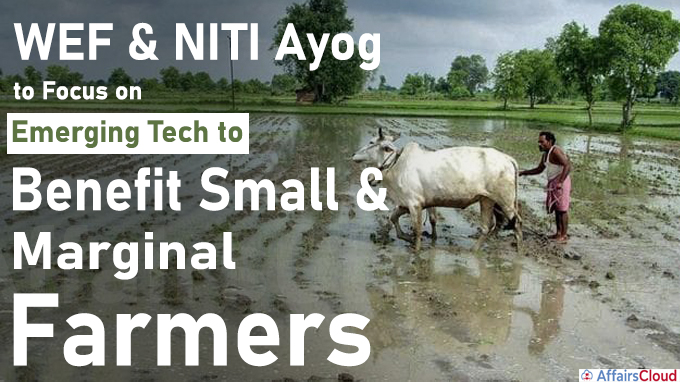
The World Economic Forum (WEF), in collaboration with India’s think tank National Institution for Transforming India (NITI) Aayog, is focusing on better utilising emerging technologies such as artificial intelligence (AI), the Internet of Things (IoT), blockchain, and drones to benefit small and marginal farmers and boost their economies.
Centre for the Fourth Industrial Revolution, India (C4IR) of the WEF:
On January 23, 2018, the World Economic Forum announced the establishment of the Centre for the Fourth Industrial Revolution (C4IR) in India at the Annual Meeting in Davos, Switzerland.
It was formally launched in India on October 11, 2018, and it acts as a platform for technology governance in the Indian context, assisting core sectors like agriculture, health, urban transformation, urban space, and the environment in harnessing the Fourth Industrial Revolution (4IR).
- In the year 2020, the C4IR launched its agriculture initiative, initially with the government of Telangana employing AI for agricultural innovation.
- In addition, it is collaborating with the Union Ministry of Agriculture and Farmers Welfare to launch the India Digital Ecosystem for Agriculture (IDEA) at Professor Jayashankar Telangana State Agricultural University in Hyderabad, Telangana. The objective of IDEA is technological and value transformation.
To enhance the economy of small farmers, the WEF states three buckets of challenges” three categories of problems
i.Inclusivity: Because small-scale farmers lack credit history and women farmers lack land holdings, both are limited in their access to credit and are obliged to borrow at higher rates than banks offer.
- To solve this issue, the World Economic Forum focuses on financial inclusion and insurance, as banks have difficulty lending to such farmers.
- For better decision-making and to bridge the funding gap, it intends to use drone data, weather data, soil health data, potential defaults or hazards, and construct credit-related data using AI.
ii.Sustainability: Farmers, in addition to dealing with floods, utilise excessive fertiliser, insecticides, and water, all of which are less sustainable.
- The WEF assists in the development of improved technological services to promote sustainable farming and lower expenses.
iii. Efficiency: Farmers face a 40% post-harvest wastage rate when their surplus does not generate revenue and is discarded.
- WEF aims to address these vulnerabilities by establishing market places and attempting to give a source of increased revenue through enhanced markets, quality, and traceability. It also aids them in overcoming warehouse challenges.
Initiatives of the Centre for the Fourth Industrial Revolution, India (C4IR) of WEF:
i.The Sagu Bagu Pilot Project in Telangana: The pilot project in chilli and groundnut was launched in October 2020 and covers two districts in Telangana. It employs artificial intelligence for agricultural innovation.
ii.Other initiatives include, a turmeric project in Meghalaya and the leveraging of Karnataka’s data platform – Farmer Registration and Unified beneficiary Information System (FRUITS) which contains 15 data sets curated by independent entrepreneurs operating at the village level.
iii. Public-Private Partnerships (PPP): The WEF has also established a food innovation cluster in Madhya Pradesh and called for PPP in the select value chain, where the state government has proposed a few high-value-chain horticultural crops and soyabeans.
About the World Economic Forum (WEF):
The WEF is the International Organization for Public-Private Cooperation.
Founder & Executive Chairman – Klaus Schwab
Establishment – 1971
Headquarters – Cologny, Geneva, Switzerland




